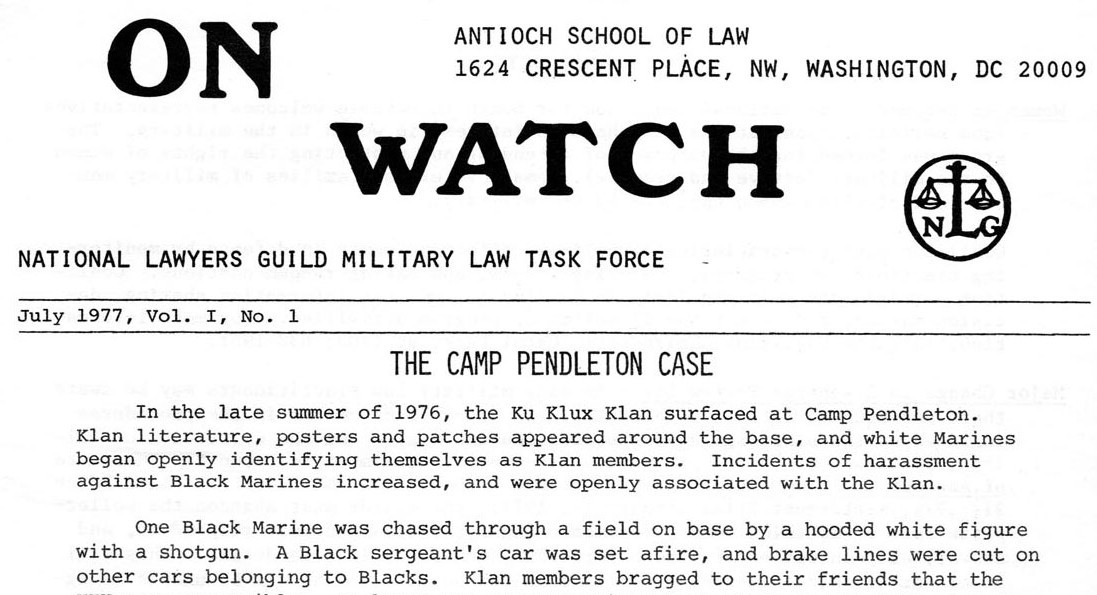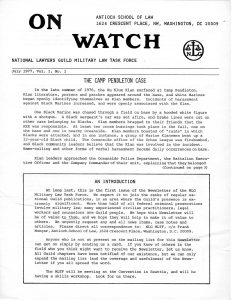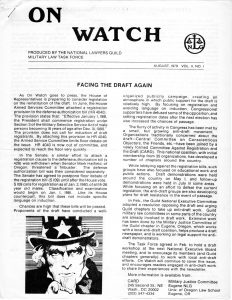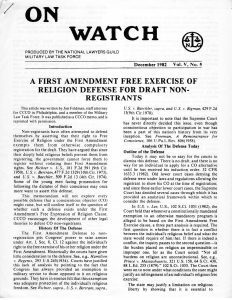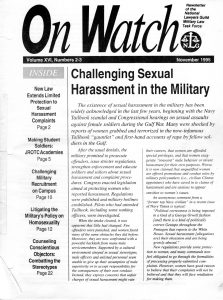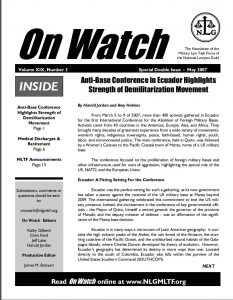By Kathy Gilberd | Online Feature
In July 2017, the Military Law Task Force (which started in 1970, see “Born in Vietnam,” On Watch, October 2015) and friends celebrate the 40th anniversary of On Watch, an invaluable resource for the Task Force and the military law and GI Rights counseling communities. It’s been a time of many adjustments for the US military, with changes in policies affecting LGBT, women, troop recruitment, and veteran services, but there is a hopefully unsurprising consistency and insistency to MLTF’s perspective and communications in that time. We have always been and remain active in seeking and supporting rights and justice for all service members, protecting resisters and whistleblowers, and challenging the violent culture within and the imperialist activities of our military.This overview takes a look at the breadth of articles and practice guides carried in On Watch for the last four decades. Its author has been involved with On Watch since 1979, both as an editor and its most frequent writer. A sidebar piece by Rena Guay, production editor for On Watch since 2009, reports on the digital side of MLTF publications – itself fraught with frequent changes — and a proposed project to create a catalog of articles and scan all the extant issues from the era before desktop publishing and make them available on the website.
- July 1977
- August 1979
- December 1982
- April 1986
- November 1995
- May 2007
Beginning
MLTF’s news publication debuted with the name On Watch in July of 1977. Vol. I, No. 1, introduced the newsletter and included, among other things, a detailed article on the Pendleton 14, a group of Black Marines court-martialed for an attack on what they understood was an on-base meeting of the local Ku Klux Klan. It was written by attorney Howard DeNike and the Pendleton 14’s Legal Defense Fund.
Founded and produced by law students and faculty at Antioch Law School, On Watch was published monthly and then bi-monthly through April of 1978. It included practice articles on handling discharge proceedings based on alleged homosexuality or homosexual acts and analyzed LGB rights cases of that period, including Saal v. Middendorf. In addition to news briefs about military law and policy, articles covered anti-unionization legislation and regulations, benefits for incarcerated veterans, a challenge to military racism by court-martial victims under Article 74(b) of the UCMJ, and Article 138 complaints. The January-February, 1978 issue discussed the settlement in Lipsman v. Brown, in which the Army agreed to amend its discharge regulation, AR 635-200, to require that personality disorder discharges be based on diagnoses by physicians with psychiatric training and that personality disorder discharges normally be fully honorable.
Keeping on
After a period of reorganization, MLTF moved its office and On Watch to San Diego, where publication began again in August 1979, with Charles (Ted) Bumer and Kathy Gilberd as editors. During this period, with relatively little GI movement activity, the newsletter focused on a range of military law issues, including the looming presence of draft registration and the military’s policy on homosexuality. Articles ranged from a review of Selective Service regulations and editorials opposing draft registration to DoD’s urinalysis policy to the elimination of the Catlow-Russo defense (used as a defense by soldiers who were involuntarily enlisted as a court-ordered alternative to jail or prison). In the 1980’s, increased attention was given to draft registration, with analysis of Selective Service regs, review of the Solomon Amendments, four primers on defense of registration resisters, articles on the first prosecutions (Ben Sasway, David Wayte, Gillam Kerley and others) and an analysis of the “active enforcement” prosecutions of randomly-selected non-registrants by draft resister and MLTF member Gillam Kerley.
On Watch also carried editorials on the tasks of the anti-draft movement. One such piece was “Why Am I Here? Why Are You Here? Introducing Politics into Draft Counseling” by attorney David Cooper; another was “Racism and Class Bias in Conscientious Objection Cases,” by Kathy Gilberd. Military and veterans law continued to be a focus, however, with articles on Agent Orange litigation, AWOL policies and military search and seizure, as well as continuing analysis of changing regs and litigation on homosexuality, the military’s conduct of anti-lesbian “witchhunts,” and discussion of strategies for organizing within the military. The December 1982 issue included a detailed discussion of DoD’s significant revision of discharge regulations, which remain the underpinnings of today’s discharge system. In December 1984, On Watch reprinted “Black American Soldiers in Vietnam,” by Professor Gill of Tufts University, originally featured in the Indochina Newsletter. A new manual produced by MLTF, the Midwest Committee for Military Counseling, and several other NLG committees—Fighting Back: Lesbian and Gay Draft, Military and Veterans Issues—was reviewed in the May 1985 issue.
In August, 1985, On Watch ran its first article on military HIV (then HTLV-3) policy, critiquing the Navy’s practice of discharging sailors with AIDS on the basis of information they gave to military doctors about gay sex, written by attorney R. Charles Johnson. He discussed, in particular, the case of Bryan Kinney, whose gay discharge and subsequent litigation, handled by MLTF and ACLU members, roused significant public opposition to the military policy. The next issue, in April, 1986, announced DoD’s policy change in response to that opposition—members could no longer be administratively separated or disciplined for information given to health care personnel in the course of HTLV-III evaluation. That issue also discussed an unsuccessful MLTF challenge to the military’s new policy of HTLV-III testing of all personnel.
Attorneys Bill Smith and Tom Turcotte increased our coverage of VA law during this period; Bill Smith, for example, wrote detailed analyses of the new Veterans Judicial Review Act and the Court of Veterans Appeals.
Publication slowed down in the 1990’s, with some years having only a single issue. An undated (probably 1992) issue, Volume XV, Numbers 1-2, focused on lessons of the Gulf War for military attorneys and counselors. It included articles on counseling CO’s during wartime, gay discharges during the war, immigration consequences of desertion and related offenses, a report of a post-war conference on counseling and resistance, and similar articles. The following issue and the November, 1995, issue carried On Watch’s first substantive pieces on military sexual harassment, by Kathy Gilberd and by Harold Jordan. On Watch covered President Clinton’s interim policy on homosexuality in 1996, and discussed options for the permanent policy which was to follow.
In November 1996, On Watch published an overview of VA claims by Tom Turcotte, which remains a useful MLTF memo to this day. That issue also carried a memorial article for Ted Bumer, one of On Watch’s editors.
The Iraq War era
From 1997 through 2002, MLTF underwent a significant hiatus, and On Watch temporarily ceased publication, as a co-chair’s family health problems and Ted Bumer’s death left us without part of our leadership. In 2003, however, with the coming of the Iraq War, Task Force members Marti and Luke Hiken revived MLTF, and resumed publication of On Watch. At this point, On Watch became digitized and available online, so that the MLTF website archive includes issues back to the Spring 2003 issue.
Given the war and the increased need for legal assistance with discharges, resistance cases and AWOLs, On Watch included a heavy emphasis on those issues. The first On Watch of this period, an extensive issue in Spring 2003, carried articles on counseling conscientious objectors during wartime, discharge upgrading, and a discharge checklist. The next issue, published that winter, included material on stop loss policies by Teresa Panepinto, conscientious objection, the GI rights hotline and GI resistance. The following issue, a year later, covered military psychiatric policies and an overview of Don’t Ask, Don’t Tell, along with articles on war crimes and military resistance.
In 2007, On Watch shifted formally to online publication, and for a year published shorter but more frequent issues; the January issue focused on an analysis of the Ehren Watada resistance case by Eric Seitz, the February issue focused on military criminal law with an overview by Jim Klimaski and an article by Steve Collier on handing one’s first court-martial, “a progressive lawyer’s dive into the belly of the beast.” A double issue in May included an article by Harold Jordan and Amy Holmes on an international anti-bases conference and a review of medical discharges and retirement by Kathy Gilberd. An overview of VA cases and the first of a series on involuntary discharges made up the September/October issue, The January/February 2008 issue continued the series on involuntary discharges, announced Ehren Watada’s district court victory, and included an analysis of the use of mercenary contractors by students at Cornell University Law School. The May/June issue had a detailed discussion of military policy on sexual assaults and recounted MLTF’s legal support for IVAW’s Winter Soldier Investigation.
In January 2009, On Watch published James Branum’s extensive review of Army AWOL policies. That summer’s issue continued the involuntary discharge series and analyzed the situation of US war resisters in Canada.
David Gespass’s summary of the Marc Hall case (an Army rapper whose anti-stop-loss lyrics were considered threats) and the Alexis Hutchinson case (an Army mother who refused to deploy to Afghanistan because she could not find care for her ten-month old daughter) were carried in the January/February 2010 issue. The issue also carried an analysis of changes in personality disorder discharges, mandated by Congress, which required second opinions and service surgeon general review of these discharges where combat vets suffering from Post-Traumatic Stress Disorder or Traumatic Brain Injury might have been misdiagnosed.
Manning case and the demise of DADT
The following issue, in March/April, continued coverage of the Hall case, reviewed the changing state of Don’t Ask, Don’t Tell, and provided a practical guide to hardship discharges. Don’t Ask, Don’t Tell was analyzed again in the next issue, along with an article on preparing for discharge upgrades before separation,
In March 2011, On Watch gave extensive coverage to the gradual death of Don’t Ask, Don’t Tell, took a look at post-Iraq War conscientious objection litigation, and discussed the Chelsea (then Bradley) Manning case. The summer issue included a lengthy discussion of GI resistance and made a call for amnesty. September’s issue proudly announced “DADT Dead: Victory after 18-year battle,” and in subsequent issues Jeff Lake followed the dismantling of the policy and the problems still facing LGB troops. Both the September and December 2011 issues covered counter-recruitment work in local high schools.
New DoD policies on sexual assault were highlighted in the March 2012 issue, along with Bill Galvin’s analysis of the rising number of conscientious objection cases. That June’s issue carried a memorial for Karen Detamore, a long-time MLTF activist and attorney, and Kit Anderton’s extensive analysis of the new Integrated Disability Evaluation System, as well as an article on the military’s increasing use of adjustment disorder discharges in place of personality disorder discharges to rid itself of “problem” servicemembers. In September, On Watch continued its coverage of the Manning case and provided a detailed analysis of emergency federal litigation for military personnel by Louis Font. The December issue analyzed sexual assault and sexual harassment, gave an update on the Manning case, and included an outline and flowchart on involuntary administrative discharges.
Becca von Behren wrote “Navigating the VA” for the March 2013 issue, and Kathy Johnson analyzed the role of women in combat and in the military. The June issue included an overview of minority enlistment discharges by Emily Gallagher, pre-trial motions in the Manning case (in which the military judge ruled that 1,000 days of pre-trial detention did not violate speedy trial rights) and articles on sexual assault and on veterans’ organizing. The December issue reviewed the Military Whistleblower Protection Act and Article 138 complaints.
In March 2014, Reber Boult discussed his experience with ROTC as a substitute teacher: “A Day with JROTC: Training ‘Gangsters’ for Capitalism;” and Kathy Gilberd gave a detailed analysis of sexual assault policies in the then-new National Defense Authorization Act. The June issue carried James Branum’s practice guide on non-judicial punishment, and Deborah Karpatkin took a look at trends in conscientious objection cases. September’s issue reprinted MLTF’s letter to the Department of Defense’s Military Justice Review Group (written at DoD’s request), suggesting basic changes in the UCMJ, along with an article by Jim Klimaski on retaliation for those who make sexual assault or harassment complaints. In December, On Watch published Maria Santelli’s article on conscientious objection among secularists, and MLTF announced its sponsorship of a campaign to save public schools from militarism and corporatizion.
In 2015, amid official commemorations of the Vietnam war, On Watch published David Gespass’ history of the MLTF; the article ended by pointing out that “GIs are, in ever larger numbers, feeling the same disaffection and opposition to the military today that they did to the war in Vietnam. And the Guild, through the Military Law Task Force, will do its part to assist them in transforming their disaffection and opposition into effective resistance.”
2016 saw issues analyzing the role of women in combat, and the military after Don’t Ask, Don’t Tell; trends in conscientious objection cases and the implications of Hobby Lobby and the Religious Freedom Restoration Act for conscientious objectors; the then-new transgender policy and Chelsea Manning’s case. Issues so far in 2017 have looked at the implications of the Trump administration for the GI rights advocacy community, new sexual assault provisions of the 2017 National Defense Authorization Act and military policies against hazing and bullying. The summer issue carried a memorial for Teresa Panepinto, whose work helped build the GI Rights Network and sustain MLTF. It also included an outline of the work MLTF proposes to do to prepare for increased warfare in the Trump era—everything from updating its memos on dissent and discharges to creating rapid response teams for resistance and conscientious objection cases.
Conclusion
Over the years, On Watch has reflected the breadth of MLTF’s work, and analyzed specific campaigns such as support of resistance to the Iraq and Afghanistan wars, challenges to military sexism, homophobia and sexual violence, and support for veterans’ rights. On Watch stands alone as a publication building progressive military law skills for attorneys and counselors, at the same time bringing the Guild’s political perspective to military personnel policies and the military “mission.”
We will continue to publish – via whatever means are current and most accessible – for the foreseeable future, as long as service members need information and support and as long as their legal advocates need reliable resources and peer guidance.
We rely on memberships and donations to sustain our publications and other activities. If On Watch has provided you with useful information during its 40 years, please consider a donation. Any amount is much appreciated.
History
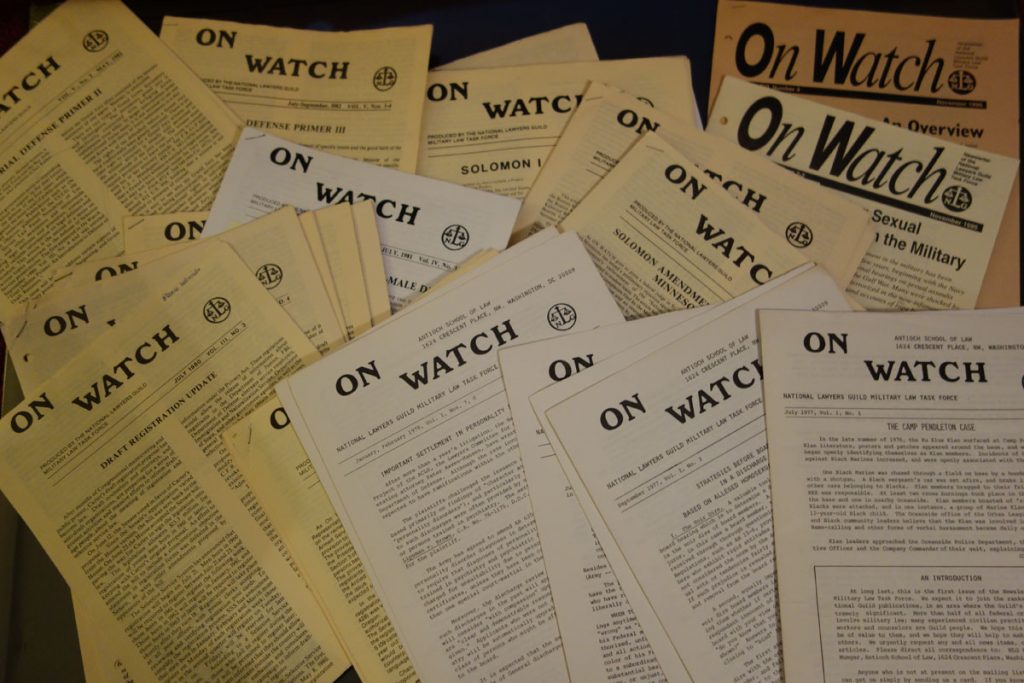
MLTF’s On Watch journal/newsletter was first published in July, 1977, carrying articles on military law and commentary on military policy. It continued as a monthly, bi-monthly and occasionally annual publication through November, 1996, when it went into a hiatus until the beginning of the war in Iraq.
We published three issues in 2003 and 2004 before another pause, and then resumed production in 2007. The subsequent publishing schedule has been sometimes erratic (as with most volunteer organizations), multiple issues have been published each year since, except for 2015 when only one issue was produced.

